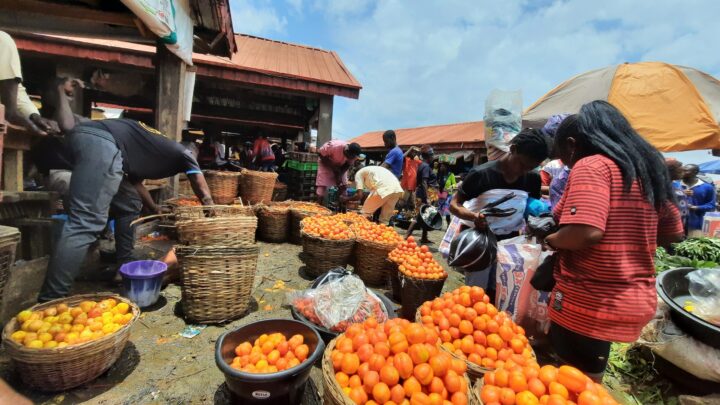Oke-Odo tomato section, Lagos
BY DAVID ADELEKE
In 2018, Godwin Emefiele, the Central Bank of Nigeria governor, revealed an interesting fact about Nigerians that, in many ways, explains the state of the country’s food manufacturing industry. He said that Nigerians spend an average of 73% of their income on food and beverages products. However, he also noted that most Nigerians will instead go for food and beverages products made outside of the country when faced with a choice.
Now, this is not in any way an indictment of the food manufacturing industry. Food and beverage processing alone make up the large majority of Nigeria’s manufacturing output. This reflects the might of the country’s agricultural sector. The Food and Agriculture Organisation of the United Nations reports that agriculture contributed to 22.35% of Nigeria’s GDP between January and March 2021.
Flanders Investment and Trade writes that “With almost 100 million people actively involved in subsistence farming and contributing 21% of the GDP, it can be inferred that Nigeria is, quintessentially, an agrarian economy that slowly develops food manufacturing and service sectors.”
Simply put, both Nigeria’s food manufacturing and agricultural sectors already contribute massively to the economy. However, there is so much more room for growth, and the food manufacturing industry lags behind. For example, the processed food industry is expected to grow by tens of billions of dollars in the next thirty years. But, as things stand, Nigeria depends on imports to meet the demand for most of its processed foods. Between 2016 and 2019, Nigeria spent N3.35 trillion on agricultural imports. That is four times more than it made from agricultural exports within that period (N803 billion).
Nigerians spent an estimated $44 billion on food in 2017, with an average spend per person of $220 per annum. Expect this figure to rise with inflation and the resultant increased price of goods. According to the World Trade Organisation, Nigeria is the largest market for foodstuff in Africa. This is expected, as it is the most populous country. Yet, there is a massive imbalance between demand and locally-produced supply. This is as a result of the inability of the food manufacturing sector to meet up.
There are a few factors that contribute to this inability to meet up. There are the usual suspects: inadequate power supply, poor road networks, water shortage, etc. All of these lead to high operating costs, which eats into profit margins and reflects on the price of goods sold to customers. So, as much as food manufacturers produce, Nigerians still have to rely on imports to make up for demand.
In 2018, food imports made up roughly 11% of Nigeria’s total imports. That is over $5.8 billion worth of agricultural products. These imports included rice, sugar, wheat, dairy products, frozen fish, vegetable oil, etc. Most of them arrived from Brazil, China, Indonesia, South Africa, the US, and the UK. More importantly, however, some of these products are also produced locally.
Two other factors contributing to the imbalance between demand and locally produced supply are Nigeria’s fast-growing population and rapid urbanisation. According to Flanders’ report, Nigeria’s population grew by 2.9% to 202 million from 2018 to 2019. The report also noted that more than half of that population is in urban centres, with a further half of them living in capital cities.
All of this points to one thing: Nigeria needs to invest far more than it currently does in food manufacturing. The logic is simple: as demand increases, supply should increase with it. However, supply can only grow to the extent to which production is possible. So, the more difficult it is to produce something, the more likely it is that demand will be met elsewhere. Investing more in the mechanisms that encourage supply also means that, at some point, supply might exceed local demand and then spread internationally. In summary, the more Nigeria invests in its food manufacturing process and infrastructure, the more likely it is that Nigeria, too, can become a major exporter of processed food.
Nigeria already exports significantly, but it often does so with basic goods that, if invested in further, could generate far more than they currently do. According to PwC, Nigeria’s major food exports are cocoa ($698 million), oilseeds and oleaginous fruits ($156 million), dairy products ($68 million), and spices ($48 million).
In 2018, Nigeria exported $79.7 million worth of fermented cocoa beans to the Netherlands. But imagine what could be if this were further processed to meet the exact culinary needs of the citizens of the Netherlands. So, instead of exporting the ingredients, Nigeria’s manufacturing industry was so mature that it could deliver the exact goods needed. This is just one more example of what could happen with more investment in the manufacturing industry.
In the past, the Nigerian government has created several policies and programmes to help increase agricultural productivity. The reasoning is that this will help increase the quantity of food produced to meet local demand. Some of these policies and programmes include the Agriculture Promotion Policy (APP), Nigeria-Africa Trade and Investment Promotion Programme, Presidential Economic Diversification Initiative, Economic and Export Promotion Incentives and the Zero Reject Initiative, etc.
However, the food manufacturing industry also needs policies, programmes, and efforts from private entities specifically designed to help increase production power, reduce production costs, and ultimately empower Nigeria to play a more active role in preventing a food crisis within our borders.
During a private sector exploratory dialogue on Nigeria’s food systems, organised by Nigerian Economic Summit Group (NESG), in collaboration with the Ministry of Budget and National Planning, the United Nations (UN) Nigeria and the Alliance for Green Revolution in Africa (AGRA), one of the key takeaways was the need for increased private sector participation to bridge the existing production gap.
Participation from all players has become critical at this point. To meet up the demands of an expanding population, there is the need for increased direct investment and capital injection by private sector players and institutional investors, whether local, FDI and FPI.
To move Nigeria forward and into a future beyond oil dependency, we need to create a platform for local food manufacturers to excel. We need to invest more in identifying and closing the gaps between Nigerian food manufacturers and the global players that supply the imported goods Nigerians love to consume. Where there are infrastructure gaps, we must do more to close them. Where there are knowledge and resource gaps, we must do all we can to close them.
Opportunities abound for local food manufacturers to spread their reach within the country. We know the demand is there. Now, we must do all we can to meet that demand. There is no longer any room for playing small.
Adeleke is a writer, communications manager, and content strategist. He writes about topics at the intersection of technology, business, and strategy.






